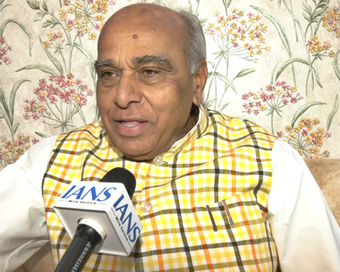 PM Modi visit USA
PM Modi visit USA Only the mirror in my washroom and phone gallery see the crazy me : Sara Khan
Only the mirror in my washroom and phone gallery see the crazy me : Sara Khan Karnataka rain fury: Photos of flooded streets, uprooted trees
Karnataka rain fury: Photos of flooded streets, uprooted trees Cannes 2022: Deepika Padukone stuns at the French Riviera in Sabyasachi outfit
Cannes 2022: Deepika Padukone stuns at the French Riviera in Sabyasachi outfit Ranbir Kapoor And Alia Bhatt's Wedding Pics - Sealed With A Kiss
Ranbir Kapoor And Alia Bhatt's Wedding Pics - Sealed With A Kiss Oscars 2022: Every Academy Award Winner
Oscars 2022: Every Academy Award Winner Shane Warne (1969-2022): Australian cricket legend's life in pictures
Shane Warne (1969-2022): Australian cricket legend's life in pictures Photos: What Russia's invasion of Ukraine looks like on the ground
Photos: What Russia's invasion of Ukraine looks like on the ground Lata Mangeshkar (1929-2022): A pictorial tribute to the 'Nightingale of India'
Lata Mangeshkar (1929-2022): A pictorial tribute to the 'Nightingale of India' PM Modi unveils 216-feet tall Statue of Equality in Hyderabad (PHOTOS)
PM Modi unveils 216-feet tall Statue of Equality in Hyderabad (PHOTOS)The Badminton Association of India (BAI) has announced a 14-member-strong India squad for
- Men’s Sr Hockey Nationals to be played in division-based format from April 4
- Mensik denies Djokovic 100th title in Miami final
- KIPG: Son of a vegetable vendor, Bihar’s Jhandu Kumar eyes Worlds, 2028 Paralympics
- Hardik Singh credits hard work and team unity for receiving HI Midfielder of the Year award
- Djokovic, Alcaraz land in same half of Miami draw
Waqf Board not religious but administrative body : Jagdambika Pal on inclusion of non-Muslims as members Last Updated : 17 Apr 2025 01:33:15 PM IST 
Jagdambika Pal The Joint Parliamentary Committee (JPC) chief, Jagdambika Pal, on Thursday rejected the inclusion of non-Muslim members in Central Waqf Councils and State Waqf Boards as an ‘encroachment’ in the religious rights of minorities, reasoning that it was essential for better upkeep and maintenance of Waqf properties.
The JPC chief, speaking to IANS, said that the Waqf (Amendment) Act has been brought with a clear motive and i.e. ‘respect for Islam and gift for Muslims’.
“Waqf Boards are not religious but administrative bodies. Hence, if capable and efficient non-Muslims become part of the Board, it will not be an interference in the religious rights of minorities, but it will only enhance transparency, accountability and efficiency in the management of Waqf properties,” Pal said.
The JPC chief’s assertions come amid the hearing of a clutch of petitions by the Supreme Court, where the latter also asked questions about non-Muslims getting a role in the Waqf Board.
Pal cited two court rulings from 2010 (Ram Rajya Foundation Vs Waqf Board) and 1982 in Karnataka and stated that in both cases, the respective courts adjudged Waqf Boards as administrative bodies.
"As it has been established by court rulings, Waqf Board is an administrative body and the JPC has only recommended strengthening its framework by paving the way for inclusion of capable and efficient managers in the Board," he said.
He also cited the JPC’s recommendation of inclusion of an Islamic scholar in the Waqf Tribunal as a progressive step.
Addressing the issue of the Collector being the ‘final authority’ in deciding any property dispute, he said that this provision has been altered and now the state-level secretary or Commissioner-level officer will decide the outcome in case of any dispute, thus ruling out any scope of bias.
Allaying apprehensions over removal of the ‘Waqf by user’ clause, he said that the legislation will be effective in prospective and not with retrospective effect.
“It is essential to digitise the records. Going forward, every property that is being given as ‘waqf’ should be in government records. This will only bring transparency and cut down scope for property disputes,” he reasoned.IANS New Delhi For Latest Updates Please-
Join us on
Follow us on








172.31.16.186







